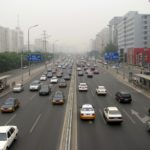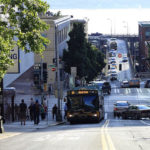Posts tagged with 'Washington'
The emergence of the Green New Deal has inspired unprecedented activism and lively debate about the future of climate action in Congress and the relationship between climate policy and a broader economic and social equity agenda. So far, it’s only been talk, since ...

Introduced in a basic form in the 1960s, bike-sharing services are now seemingly ubiquitous in many major cities. The propagation of “dockless” systems, shared bicycles that can be parked nearly anywhere, has led to unprecedented growth, increasing the number of ...

Washington, DC, has been one of the foremost laboratories for tech-driven innovations in the transport sector. The city implemented North America’s first bike-share system, and most recently it welcomed companies to experiment with the latest transport trend: “micro mobility,” or ...

With ride-hailing services like Uber and Lyft continuing to gain popularity and drawing attention for their impact on congestion and other urban ills, cities from Washington to São Paolo are moving to the seemingly inevitable next step: special taxes. This is unsurprising. ...

“Ride-hailing” or “ride-sourcing” companies like Uber, Easy Taxi, Ola and Didi have made it much easier for passengers to get around cities everywhere, providing real-time location data, increasingly accurate arrival times, seamless payment and customized services. Goldman Sachs estimates the ...

Last December, Beijing’s city government issued a “red alert” for smog levels—the highest possible designation. Schools and construction sites closed, traffic was restricted, and air pollution reached 10 times the World Health Organization’s recommended limit. Meanwhile, residents in neighboring cities ...

EMBARQ, the sustainable urban transport and urban development program of the World Resources Institute (WRI), and the World Bank co-organized Transforming Transportation on January 16 and 17 in Washington, D.C. For more information about this year’s conference, visit www.transformingtransportation.org and see TheCityFix’s live coverage ...

Welcome back to TheCityFix Picks, our series highlighting the newsy and noteworthy of the past week. Each Friday, we’ll run down the headlines falling under TheCityFix’s five themes: integrated transport, urban development and accessibility, air quality and climate change, health and ...

Welcome to “Research Recap,” our series highlighting recent reports, studies and other findings in sustainable transportation policy and practice, in case you missed it. Informed Transit Time Savings A new study on the impact of mobile real-time transit information on ...

Welcome back to TheCityFix Picks, our series highlighting the newsy and noteworthy of the past week. Each Friday, we’ll run down the headlines falling under TheCityFix’s five themes: integrated transport, urban development and accessibility, air quality and climate change, health and ...

Welcome back to TheCityFix Picks, our series highlighting the newsy and noteworthy of the past week. Each Friday, we’ll run down the headlines falling under TheCityFix’s five themes: integrated transport, urban development and accessibility, air quality and climate change, health and ...

Welcome to “Research Recap,” our series highlighting recent reports, studies and other findings in sustainable transportation policy and practice, in case you missed it. Healthy GHG Mitigation The World Heath Organization (WHO) released a new report on the health benefits ...

Welcome back to TheCityFix Picks, our series highlighting the newsy and noteworthy of the past week. Each Friday, we’ll run down the headlines falling under TheCityFix’s five themes: integrated transport, urban development and accessibility, air quality and climate change, health and ...

Photo by mocodragon. While the fuel economy standards in the latest energy bill are a welcome first step, giving us some relief from stagnation in fuel economy from vehicle fleet, the California approach, which treats greenhouse gases as pollutants, and ...

Photo by mj*laflaca In 2002 the National Academy of Sciences wrote a report suggesting a modest raise in new car fuel efficiency – from 28 miles per gallon to around 32 – was justified. The Bush Administration ignored this finding. ...




























